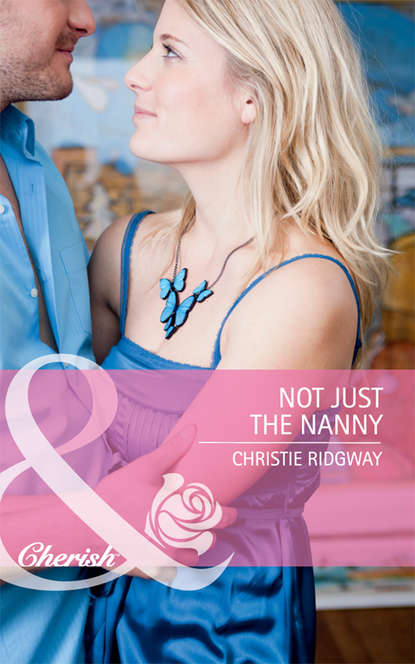
Полная версия
In The Stranger's Arms
When she opened the door, the scent of peach potpourri welcomed her into the shop’s cozy interior. An old-fashioned glass display case and a service counter ran along one wall of the deep, narrow space that she had brightened with sunny yellow paint. On the other wall were shelves and pigeonholes full of fabric samples and threads from all over the globe. A row of circular display racks holding pattern charts and kits filled the middle of the main floor. Every bit of wall space was covered with a variety of finished projects: cross-stitched pictures, bell pulls, afghans, bookmarks and everything else that could be decorated with threads. Stairs led up to an overhead half loft she used for classes and extra storage.
The solid wood floor and the high ceiling were original. The water pipes in back rattled like chains on Halloween. The furnace was cantankerous. Summer business was crazy, winter nearly dead, ordering the right stock a crapshoot and staying in the black an ongoing challenge. Despite everything, Pauline dreamed of expanding.
After she put her purse and laptop in the tiny office tucked behind the staircase, she called Bertie Hemple-mann, an older woman who worked part-time in exchange for floss and fabric. Bertie agreed to fill in for a couple of hours so Pauline could leave.
With that problem solved, she counted money into the register and finished unpacking a carton of British cross-stitch books. While she worked, she hummed a jingle that had lodged into her brain on the way to work.
For the last five years, Uncommon Threads had been hers. She loved every square inch of space and each moment she spent here. With each sale she made and each month she turned a profit, she took another small step toward regaining her self-respect and putting the past further behind.
At ten o’clock sharp she unlocked the front door and flipped the hanging sign from Closed to Open. When she wasn’t helping the customers who trickled in, she unpacked cartons of kits, restocked the swivel racks and opened her morning mail. Along with a stack of invoices and bills was a brochure from a big needlework show in the Midwest that made her salivate. Someday, she promised herself as the bell over the door jangled merrily, signaling a new arrival.
“Hi, Paulie,” called out the tiny woman who owned the import shop next door. Lang, whose name meant “sweet potato” in Vietnamese, had elbowed open the door while she’d balanced a cardboard holder with two steaming lattes.
“Is it that time already?” Pauline asked, startled. She and Lang had gotten into the habit of sharing their morning break while Lang’s husband, Dao, minded their shop next door.
Pauline bit her lip. “I’m going to be gone later, so I shouldn’t take a break,” she said after she’d thanked Lang for the hot drink.
“You want me to leave now?” Lang asked. “You need Howie to mind the store for you?” Howie was her American-born son who helped out in the family business part-time when he wasn’t in school.
“No, stay,” Pauline replied, blowing on her coffee to cool it. “It’s okay. I called Bertie.”
“You aren’t unwell, are you?” Lang asked, perching on the spare chair behind the counter. It seemed as though the only times she or her husband ever missed work were to see the doctor or, once in a while, to watch Howie play baseball for the local high school team, the Bobcats.
Pauline was tempted to say she was going to see the insurance agent, since Lang knew about the damage to her garage roof. Instead she explained as briefly as she could about her new boarder.
Lang tipped her head to the side like a bird, her black eyes twinkling with mischief. “And this Mr. Wade, is he handsome?” she teased.
The heat that warmed Pauline’s cheeks had nothing to do with the steam from her latte. “Um, I suppose.” Her attempted nonchalance was ruined when she shrugged and almost spilled the contents of her cup onto her dress.
“You didn’t notice?” Lang shook her head. “What am I going to do with you?” She refused to believe that Pauline enjoyed the independence of being single. For Lang, family was everything.
Face flaming, Pauline ducked her head. “I noticed,” she admitted, annoyed at her inability to lie convincingly.
She was—quite literally—saved by the bell when the front door opened to admit Harriet Tuttle, president of the needlework guild, matriarch of local society and self-appointed keeper of the town’s morals.
Immediately Lang got to her feet. “Good morning, Harriet,” she said with a polite smile.
Harriet acknowledged the Vietnamese woman with a chilly nod before switching her attention to Pauline. Behind Harriet’s back, Lang rolled her eyes.
“I must get back,” Lang said.
“See you later,” Pauline replied before meeting Harriet’s beady-eyed stare with her best shopkeeper’s smile. “What can I do for you today?”
“I heard that a tree fell onto your carriage house during the storm,” Harriet said.
“Bad news travels fast,” Pauline replied, wishing the phone would ring. Not only was the older woman one of the worst gossips in town, but her husband was one of the Crescent Cove city council members who would be vetting Pauline’s application. “Actually it was a limb that fell, not an entire tree.”
Harriet sniffed as though she didn’t care to be corrected, even by the primary witness. “Who have you contracted to fix the damage?” she persisted as she glanced around. “Not that Steve Lindstrom, I hope?”
For a moment, Pauline was puzzled by Harriet’s apparent hostility. Blond, blue-eyed native resident Steve should fall within her narrow parameters of who was an acceptable member of their community—even though he was divorced, which probably earned him a black mark in her book.
Suddenly Pauline recalled hearing that one of Harriet’s sons had recently started his own construction business. Was that why she had stopped by—to drum up work for him?
“The repairs are really pretty minor,” Pauline explained, fingers crossed behind her back. “My new boarder is actually going to do them.”
Harriet’s bushy white brows arched above the silver frames of her glasses. Her upper lip curled with scorn, drawing attention to the thin mustache that adorned it.
“You hired a female contractor?” As someone who prided herself on knowing everything that went on in the town, she was well aware that Pauline only rented her rooms to women.
Until now, at least.
Before Pauline could reply, Harriet made an irritating tsking sound. “My dear, despite popular opinion, there are certain tasks that women will never have the strength or the dexterity to perform as well as men.” She patted her own bony chest. “When I was younger, I certainly wouldn’t have been interested in using tools,” she continued as though the term were something obscene, “or climbing ladders like some sort of monkey from the jungle.”
Pauline blinked away the disturbing image that came to mind of Harriet looking like a female Tarzan or wearing a hard hat and safety goggles as she cut through a sheet of plywood with a power saw. Although Pauline abhorred the notion of pounding people into narrow slots like wooden pegs, she couldn’t afford to alienate the old crone.
Knowing Harriet would consider it a blemish on Pauline’s character if she were to hear the truth from another source, Pauline pretended a calmness she didn’t feel. She rearranged some of the thread cutters and clip-on lights in the display case while she debated her options.
“Mr. Garrett is newly returned from California,” she finally admitted. “He needed a place to stay, so we worked an agreement.”
“Garrett?” Harriet echoed with a frown. “I don’t recall that name.” She sniffed again. “I certainly hope you know what you’re about.”
Pauline held on to her temper by reminding herself silently of just how much influence Harriet wielded in this town. Her family, the Barthropes, had been among the first settlers to the area—a fact she never let anyone forget.
Pauline made a noncommittal sound in her throat that she hoped would satisfy the old bat.
“How fortunate that you have the rooms over the carriage house,” Harriet continued. “A woman in your position must guard her reputation, especially after the unfortunate events in your past.”
Pauline nearly choked. Was Harriet referring to her parents’ accident or her own broken engagement? Pauline could hardly be held accountable for either of the two most heartbreaking events of her life, but it was obvious that to Harriet they were merely blots on her reputation.
Before Pauline could think of a suitable reply, Harriet leaned forward and tapped her arm. The touch of Harriet’s bony fingers sent a shiver up Pauline’s spine, but she resisted the urge to retreat.
“If you were to attract any further negative attention,” the old woman said with a cool smile, “I would be forced to oppose your application to the city council. After all, a person who sets herself up as an example to others must conduct herself in a manner that is above reproach.”
Chapter Three
Bertie straightened her long green dress over her considerable girth. “Don’t look now,” she muttered under her breath as the front door opened and she grabbed Pauline’s arm to prevent her from turning around. “A major hottie just wandered in. Probably got lost looking for Archie’s Pub,” Bertie added in a loud whisper.
Pauline had a pretty good idea who’d just arrived. She had summoned Bertie as soon as Wade had let her know he’d finished the supply list. Ignoring Pauline’s protests, he’d insisted on picking her up here rather than meeting her at Builders’ Supply.
Even though Pauline told herself now that she had only given in to his macho demands for the sake of expediency, a knot of anticipation formed in her stomach as she extricated herself from Bertie’s loose grasp. What would he think of her little business?
“That’s no hottie, it’s my new tenant,” Pauline replied drily before she pasted on her best welcoming smile. “Hello, Wade,” she said, ignoring Bertie’s gusty sigh. “I hope you didn’t have any trouble finding me.”
He removed his sunglasses and hooked them into the neck of his shirt. “No problem. Downtown’s where it always was.”
His smile stirred a visceral response in Pauline. Silently she agreed with Bertie’s comment. If his rangy build and lean, angular face weren’t enough to ensure him a spot on the all-time hottie list, the contrast between his black hair and light-gray eyes certainly was.
Ruthlessly she pushed the thought aside as Bertie muffled her giggle behind her hand.
“Bertie, this is Wade Garrett, my new boarder.” She stepped aside so the other woman couldn’t duck behind her. She knew that Bertie could be extremely shy around strangers because of her size.
“Hi,” Bertie murmured, her gaze dropping to the floor.
Instead of dismissing her with a glance, as sometimes happened, his smile widened and he stepped forward. When Bertie, who was barely five feet tall and nearly as wide, glanced back up, he held out his hand.
“Thank you for stepping in so I can borrow your boss for a couple of hours,” he told her gravely as he enfolded her hand in both of his.
Before Pauline could protest that their errand shouldn’t take that long, Bertie nodded her head like a Bobblehead doll. “She works way too hard.”
Wade leaned closer, causing her dark eyes to widen with alarm. “Maybe we can fix that,” he said in a conspiratorial tone before releasing her hand. “I invited her to lunch.”
Bertie’s answering smile transformed her round face. “That’s a good start.”
“Hey,” Pauline protested, “you don’t need to talk about me as though I weren’t standing right here.”
Wade and Bertie exchanged amused glances. “Testy,” he observed. “She definitely needs some fresh air.”
“Take as long as you want,” Bertie said. “I can manage just fine.”
Pauline knew she couldn’t win against both of them, so she grabbed her purse from behind the counter before they managed to embarrass her further.
When she noticed how intently Wade was looking around, she was tempted to ask if he was a secret stitcher, as she thought of men who hid their needlework hobby. Somehow the image of Wade working a cross-stitch pattern wouldn’t quite gel in her mind.
“I’ll be back as soon as I can,” she told Bertie, making her escape without bothering to see if he was following her.
“Feel better now that you’ve asserted yourself?” he teased as he reached around her to open the front door.
The amusement in his voice irked her further. “I’ll feel better if my garage roof gets repaired before the next storm,” she snapped as she headed outside, only to stop abruptly when she realized she had no idea where he’d parked.
“So you’re going to be in a bad mood until it’s done?” he asked cheerfully as he led the way to his car, which was parked prominently in front of Lang’s shop.
Pauline had been about to insist that she wasn’t in a bad mood, but then she took a deep breath and reconsidered.
“I’m sorry,” she said quickly before getting into his car. “Could we go back and start over?”
He stared down at her, obviously surprised by her abrupt reversal. What an unpleasant woman he must have decided her to be—and who could blame him?
“If we go back, does that mean I’d have to give up this prime parking spot?” he asked.
She was about to ask what he was talking about when she saw the humor lurking in his eyes. “No, not good enough,” she said in an equally serious tone. “I’m afraid that really starting over means you have to drive back to San Francisco.”
To her surprise, a fleeting frown crossed his face before he smiled and gestured for her to get into his car. “Let’s just go on from here,” he suggested, leaning down to tuck in the edge of her skirt.
When he shut the door, it occurred to her that she had no idea what he had done in California or why he’d left. Perhaps he couldn’t return.
A string of possibilities marched through her mind. Was he on the run? A recently released ex-con, ashamed of his past? A grifter in search of his next victim? A car thief? A serial killer?
Oblivious to her dark thoughts, Wade slid behind the wheel, donned his sunglasses and started the engine.
“Which way?” he asked, glancing in his rearview mirror before pulling out.
Reminding herself that Bertie knew where she had gone and with whom, Pauline relaxed against the luxurious leather seat. The instrument panel was made from some exotic wood—real, not some phony laminate—and the carpet beneath her feet was as thick as her neighbor Mrs. O’Connelly’s brogue. “Follow Harbor Avenue up the long hill,” she directed him. “When you get to the top, you’ll see the big sign on the right. Turn into the parking lot.”
They rode slowly in silence while he braked for all the jaywalking pedestrians who stepped into the street without looking.
“So you worked construction down in California?” she asked as they drove past the marina.
“I was a partner in an investment firm,” he replied after an infinitesimal pause.
She couldn’t have been more surprised if he had told her that he used to be an astronaut. Imagining him in a silver space suit was only slightly more difficult than a dress shirt and tie.
“Do you plan to open an office here?” she asked. If a good profile was an indication of noble character, she had no worries. His was positively elegant.
Wade stopped at a red light and glanced at her, but his shades hid his expression. “Don’t people in this town invest their money?” he asked. “Or do they just bury it, like pirate booty?”
“For the most part, they work hard for it,” she cautioned. “They may not be eager to entrust it to a stranger.”
“I’m not a total stranger,” he replied. “My grandfather, Morris Garrett, worked in the mill here. When I was a kid, I came up to see him a couple of times during summer vacation.” He accelerated when the light turned green. “I’ve been seriously considering a career change, though, so it may not matter.”
“If you become a full-time handyman, you’ll have to trade your car in for a pickup truck with oversize tires and a toolbox in the back,” she teased, expecting him to deny the idea.
His expression was unreadable. “I’ve learned that giving up material goods isn’t that difficult,” he said enigmatically before slowing for the turn into Builders’ Supply. “Is this place always so busy?”
Even though his previous comment stirred her curiosity, she had no choice but to go along with the change of subject. To do otherwise would invite him to return the favor and question her about things she would rather not discuss.
“Restoring the old Victorians has gotten quite popular,” she said as they drove down the row. “Some of them sell for over a million dollars.”
“Have you ever considered selling your house?” he asked as he slid into an empty spot. “Maintaining a place like that must be a lot of work.” Perhaps he was thinking about going into real estate.
“No, I would never consider selling Mayfield Manor,” she replied, unfastening her seat belt. “Someday I hope to finish the renovation that my mother started.”
“A noble ambition,” he said as they walked together toward the entrance.
As they passed the outdoor display of plant pots and barbecues, Pauline spotted a big man with shaggy blond hair coming straight toward them.
“Hi, Steve,” she said. “I should have known you’d be hanging out here.”
“Hey, doll,” he replied with a grin and a questioning glance at Wade. “Did the tarp hold okay?”
“Yes, thanks.” She glanced back at Wade, who was hanging back. “Steve Lindstrom, Wade Garrett,” she recited with appropriate gestures.
The two men exchanged wary nods, hands remaining firmly in their pockets.
“Sorry I haven’t finished writing up your bid,” Steve told her. “Since the last storm, I’ve been slammed. The price of lumber’s shot up like a rocket, too, so I’ve had to recalculate everything.”
“Wade’s going to do the repairs for me,” she replied.
“Oh?” Steve’s gaze sharpened as he took the other man’s measure. “I haven’t seen you around, Garrett.”
“Wade’s from California,” Pauline explained hastily. “He’s staying at the house, so we made a deal.”
Steve’s eyebrows shot up. “I see,” he drawled knowingly.
A muscle jumped in Wade’s cheek, but he remained silent. Pauline refused to justify herself in front of an audience, but she was beginning to feel as though she should have cards printed up.
It’s just business.
“Well, let me know if you need any help,” Steve said with a nod at Wade. “Garrett.”
“Lindstrom,” Wade replied gravely.
“Thanks, Steve,” Pauline said, marveling at the male protocol, so different from that of her own sex.
“Steve’s the contractor I originally thought you worked for,” she explained once he was out of earshot.
“Oh, the contractor,” Wade echoed, snapping his fingers. “I guess his attitude had me fooled.”
“What do you mean?” she asked as she led the way into the store.
“He seemed a little territorial,” he replied. “As in, personal relationship.”
His comment caught her off guard and she didn’t even think about it being none of his business. “I’ve known him forever, but I don’t rob cradles,” she protested. “He was two years behind me in school and he dated my sister, so that makes him kind of a surrogate brother.” For some reason she didn’t fully understand, she wanted Wade to know that she wasn’t interested in Steve romantically.
“Good to know,” Wade murmured.
She didn’t bother to puzzle out his comment as she reached the door to the store manager’s office. “I’ll see about opening an account,” she said instead. “Where should I meet you?”
He glanced around. “I’ll be over in roofing.”
As Wade walked away from his landlady-slash-boss, he reminded himself that he wasn’t doing half bad after a shaky start with Wallingford and his damned lease. Wade had shelter and work to keep him occupied, while the truck with the rest of his stuff would be here this afternoon. So what was his problem?
It certainly didn’t have anything to do with meeting Pauline’s friend, Steve-o, or the fact that he’d called her “doll,” as if they had something going despite her protest to the contrary. When had Wade become afraid of a little competition when it came to a woman who interested him?
Perhaps it had begun with his castration back in Frisco. Apparently Sharon had cut off more than the obvious, but that was going to change.
By the time Pauline caught up with Wade a little while later, he’d found everything on his supply list.
“Sorry I took so long,” she said, slightly out of breath. “I ran into a customer from the shop who was here with her husband. They were picking out paint colors for their living room and I couldn’t get away from them.”
“No problem,” he replied, amused by her obvious agitation. “I ordered everything I need to start the job. It will be delivered in the morning.”
“That’s great.” Her face lost its anxious appearance. “Where’s the invoice?”
The young clerk who had been helping Wade stepped forward. “I just printed it up for your husband, ma’ am. All I need is a signature.”
Wade took the form. “Did you want to check it over first, sweetheart?” he asked Pauline with a lecherous grin.
She batted her eyes at him coyly. “Why, yes, honey. I know how crazy you can get when it comes to remodeling projects.” She turned to the clerk, who looked distinctly uncomfortable. “You should see our garage,” she confided. “I swear the man owns every power tool on the market.”
Wade rested his hand on her shoulder possessively. “Believe me, my tools don’t compare to her antique doorknob collection. I swear I should buy stock in eBay, for all the time and money the little woman spends there.”
Pauline sent him a look that promised retribution. “I think we’ve wasted enough of this poor man’s time, sugar buns. If I could just peek at the invoice, we could all move on.”
Wondering whether she intended to question each item, Wade handed it over. Quickly she skimmed the list before signing the bottom.
“Thank you for keeping him from buying out the store,” Pauline told the young clerk. “Sometimes it’s like a sickness. He can’t seem to help himself.”
“Yes, ma’am.” He was careful not to look at Wade, who was having trouble keeping a straight face. “Have a nice day, and good luck with your doorknobs.”
Wade couldn’t resist leaning closer. “Come on, baby cakes,” he murmured, breath tickling her ear. “Let’s get some lunch.”
Pauline had meant to insist that he take her straight back to the shop, but instead she found herself seated across from him at a small seafood place by the marina. It was barely more than a shack, but the food was good and the booths were comfortable.
After they seated themselves, he removed his sunglasses and set them on the scarred table. “What’s good here?” he asked as he turned over the laminated card that served as a menu.
Pauline didn’t bother looking at hers. “Everything,” she replied, realizing she was starved. “But my favorite is the fish chowder. It’s never the same, but it’s always delicious.”
A young waitress she didn’t recognize came over to take their orders. She was wearing a pink uniform with a short skirt and thick-soled white shoes that squeaked when she walked.
“What can I bring ya?” she asked, jaws working a wad of gum as she pulled a pencil and pad from her apron pocket. Her eyebrow was pierced with a small silver hoop and an elaborate tattoo circled one thin wrist in stark contrast to her outfit.
“I’ll have a cup of the chowder, a Caesar side salad and iced tea,” Pauline replied.
“Same here,” Wade chimed in. “But bring me a bowl of the chowder instead of a cup.”
“A doorknob collection?” Pauline demanded after the waitress had left. “Couldn’t you come up with anything a little less nerdy? Antique snuffboxes or African art maybe.”










